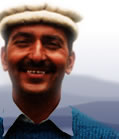 |
 |
||
 |
|||
|
RELATED THEMES communications education migration social relationships OTHER LOCAL THEMES BACKGROUND |
social change While people are positive about increases in their standard of living, a common theme throughout the collection is the mourning of a loss of "unity", "cooperation" and "sympathy for one another". The most common reason given for this is the move towards more individualistic, monetary-based livelihoods: in other words, a move away from depending on farming alone - which required collective work throughout the year - to an increase in the number of people earning a cash income either through employment or enterprise. Another interesting and related reason given by some is that as the majority of Shimshalis enjoy a better standard of living than before, they have become less dependent on one another. As people are finding it easier to provide for themselves, they don't need to lean on each other during times of hardship. According to some narrators, the relative isolation of the past also contributed to greater unity within the community. One narrator (Pakistan 28) believes that the "unity" of the past was partly a result of the forced labour required of some Shimshalis by the Mir: "Although there was repression and bonded labour under that system, due to the fear of the rulers and the local village chief, people stayed together to work collectively. In the early days when the arbob or khalifa (local religious leader) ordered or assigned any task to the people they obeyed it. They were threatened by the people from the Mir and so they had to work or complete the task at any cost." Other socio-economic factors have influenced the rise of individualism over time, for example: the end of the Mir's regime (1970s); the completion of the Karakorum Highway (1980s); more tourism; increases in education and migration; and most recently, the construction of the link road to Shimshal. The road signifies an extension of Shimshal's interaction with the outside world, and people's expectations of the changes that this will bring form part of many interviews. In recent years external contact has increased as a result of outsiders coming into Shimshal (tourists, researchers, development workers) and Shimshalis going outside (for education and employment). Both scenarios result in new ideas entering the community. One narrator (Pakistan 22) states that the presence of the army in Pamir (in the 1960s) was a significant event in terms of change: "…when the army (Pakistan Army) was posted here, bit by bit new things started coming in. Many learned the language (Urdu). A few learned development too. From then on this [modern] development started." One narrator (Pakistan 2) talks at length about change, in particular his concern over its rapid pace and his desire for Shimshal's "safe transition". Related to this is an interesting section where he describes some confusion in roles as community experiences change: "…the old people, the aged people, they were trying to close their minds because the younger ones who migrated to the cities for education, who are out, involved in the modern economic system, they were no longer able to listen to them, to respect them, so those traditional ideals, those traditional role models they were no longer there, it was going to change… there was a confusion; that was mostly, just 10 years ago I am talking… people would openly say that well this is just killing time, celebrating all these festivals they are worthless…" Sources of social status have also changed. Whereas self-sufficiency and numbers of livestock conveyed status in the past, today in Shimshal the achievements of formal education and employment are most highly valued. Several narrators argue that education does not have to signify a rejection of Shimshali culture and traditional livelihoods. The Environmental Education Programme (EEP) strives to value the knowledge and expertise of those in the community and make education more relevant to those growing up in Shimshal. quotes about social change"So these things you know the young used to gather together with the elders. And because it is a system that when after a certain age, like in their 60s, they will come to the land while ploughing but they will not work, they will just sit at the edge of the field and they will gossip, they will talk, they will talk about the history and everything. [That is how] these things have been transferred to the community. But all these systems are breaking down because of education, because of migration and because of modern interventions. And now we don't have a chance to sit with all those old people and listen to everything, so none of us know about Shimshal's history; we can't even properly speak the Wakhi language." "…we decided okay, we should work to make people realise that the things they have are valuable. And we felt that's the only way that we can make them feel pride or dignity [about being a Shimshali], because otherwise, this isolation really makes you feel discriminated...." "…the road…might bring both negative as well as positive changes. The road which might bring prosperities along, will also bring anxieties for us… All of us might start running towards wealth. And secondly, it will bring different types of visitors for us… we can say that the road might bring an attitudinal change in us. We will have to meet different types of people, and we will have to face different challenges in our daily life." The world is becoming open and closer, and that is why the flow of people is increasing day by day. This includes foreigners as well as our own countrymen. These people have different traditions, culture, way of living and talking, different values and norms… These things would create problems for us. Our old generations were living peacefully… They never saw outsiders coming frequently to our village… Their travelling was only limited to Hunza and back to the village. But today we have to meet different peoples like Japanese, Americans etc. in our own village. In ancient time people had less knowledge and information. They were ignorant but they had plenty of time and had nothing to do. The present era is good, people are knowledgeable, but they do not accept each other… people have more interactions with outside communities and each one according to their perception tries to impose their decisions on the community. "Whenever someone slaughtered an animal like a yak or a bull people would borrow from him a piece of leather and he would happily lend them understanding their needs. People would lend each other clothes, shoes etc… people would take care of each others limitations and would help each other. Today people do not borrow from one another because they possess everything. Everyone has good quality trekking shoes and sleeping bags so they don't need to borrow from each other. This is the difference between the old time and the modern time…" "…Today's young generation now no longer value qadeema aql (ancient wisdom). They tell us that this is crazy old mind… People were at peace [in the past]. People listened to each other and valued each other's views. Now if I say anything you don't obey it, you argue… Then we always listened, respected and did what the elders said. Now everyone thinks he knows better. Now those who hold pen, book, and pencil they have the say." "…when things are changing the roles should never stand stagnant, they should change in accordance with the wider changes, so and here we are lucky that we are changing and the women's role is also changing. Like there are modern institutions, like SNT is there, like councils, we have social establishments to meet the modern requirements and they are religious and social. And we've got representation from the women in all these things. They are actively participating in all social life of the village. So I hope that this will help us… for me, all these things I've been doing, or we are dreaming, been doing is just to acquire this safe transition that we can transform somewhere with something of our own, not everything all adrift." |
|